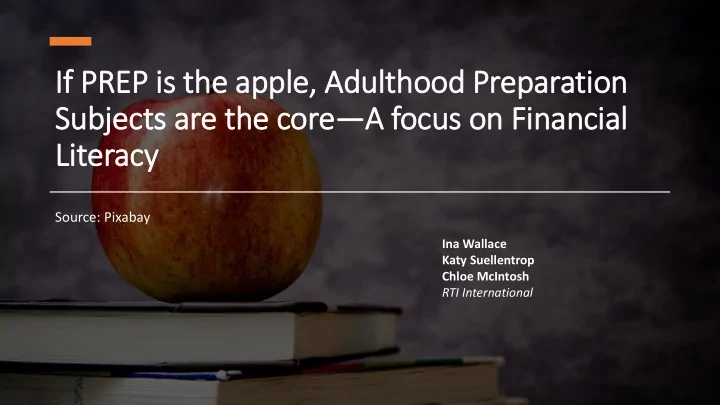

If PREP REP is the he appl pple, A Adul dulthoo hood P d Prepa eparation on Subjec ects a s are t e the e core—A f focus us on n Fina nanc ncial Literacy cy Source: Pixabay Ina Wallace Katy Suellentrop Chloe McIntosh RTI International
“It takes a village to raise a child, a team to build a dream and a community to foster financial literacy.” — Andreas Simic (poet)
• In 2019 • 1 in 4 adults said they are not paying their bills on time • 42% of adults say they have a budget and keep close track of how much they spend • 83% of millennials with debt find it difficult to Importance of minimize • Most U.S. high school students receive a Financial failing grade in financial literacy Literacy • More than 75% of youth aged 15 to 17 and 50% of youth aged 18 to 20 years do not have a bank account Sources: NFCC. (2019). 2019 Road map of consumer financial health . https://info.nfcc.org/thank-you-2019-key-findings-and-data-sheets?submissionGuid=f97c67ae-feb2-4906-9a03-22f8e6f08678# Gruenberg, M. J. (2016, June 24). Remarks by Martin J. Gruenberg, Chairman, Federal Deposit Insurance Corporation to the Urban Financial Services Coalition; Washington, D.C. Federal Deposit Insurance Corporation. https://www.fdic.gov/news/speeches/spjun2416.html Kasman, M., Heuberger, B., & Hammon, R. A. (2018). A review of large-scale youth financial literacy education policies and programs . Brookings Institution. https://www.brookings.edu/wp-content/uploads/2018/10/ES_20181001_Financial-Literacy-Review.pdf
“I feel like if you're able to manage your money, that'll help you in advance because you'll be less stressed about having to pay things off or having the feeling of you're overspending and Youth Insight feeling like you're taking on too much. I think it's important to be organized with your money because it will eventually...it'll pay off because you'll be happier in the end.” — Focus group participant
Financial Literacy within PREP Programs SPENDING AND SAVINGS AND BORROWING, INSURANCE CONSUMER BUDGETING INVESTMENTS CREDIT, AND DEBT FINANCIAL PROTECTIONS
Executive function Financial habits and Building Blocks of Financial Capability norms Financial knowledge and decision-making
Good News • Lots of existing tools, games, programs • Many of them are virtually based • Youth financial education
Source: You for Youth. (n.d.). Quick guide to financial literacy . https://y4y.ed.gov/uploads/media/Quick_Guide_to_Financial_Lite racy.pdf
Source: FDIC. (2017, February 14). Money smart for young people series grades 9-12. https://www.fdic.gov/consumers/consumer/moneysmart/young/ grades-9-12.html
Source: Jump$tart Coalition. (n.d.). https://jumpstartclearinghouse.org/resource/search/
Ideas to Try 1 2 3 4 Ask your youth what Include financial Identify strategies for Bring in a partner (local they’d like to cover and literacy games as incorporating relevant bank or other about their goals session warmups or topics (i.e. organization) to discuss icebreakers childbearing) into the financial literacy topics financial literacy games
Tools to Check Out
After Implementation Consider new Sign-up for Monitor for partnerships to newsletters to satisfaction and expand monitor new tools and potential for impact implementation resources Identify professional development Share what you’ve opportunities to learned with other increase staff capacity grantees! to address the topic
Resources • Resources for Teachers—Website that provides information about and links to a collection of federal guides, curricula for teaching Financial Literacy, and train the trainer videos. • Jump $tart Financial Smarts for Students—A coalition of national and affiliated state coalitions that provide materials to advance youth Financial Literacy. • Financial Capability and Literacy—Federal website that provides links to resources and websites for educating youth about financial topics. • Federal Trade Commission—Provides basics of consumer protection regarding managing money, using credit and loans, and identity protection. • You For Youth - Quick Guide to Financial Literacy—A resource of the U.S. Department of Education that has suggestions for activities to teach basic knowledge, skills, and behaviors regarding earning, saving, borrowing, investing, insuring, budgeting, and planning.
Poll Everywhere • What activities have you tried for Financial Literacy? • What is one thing that you are excited to try?
Thank you!
Q&A
Recommend
More recommend